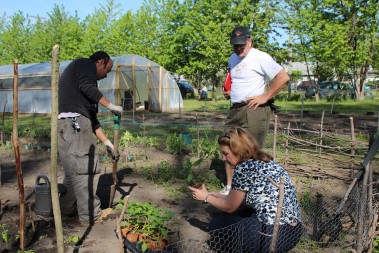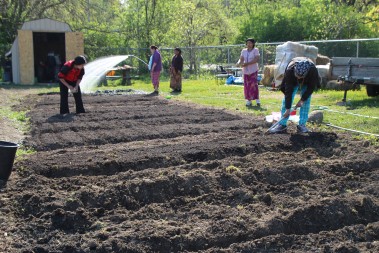May 15, 2013 // Local
Catherine Kasper Place promotes Fresh Food Initiative

Chan Aung, project coordinator for Catherine Kasper Place Fresh Food Initiative digs in the urban garden at right, while farm manager, Jeff Kachmar, standing, discusses planting with Catherine Kasper Place Director Holly Chaille. The initiative offers farmland to refugees to raise produce to consume and sell at market.
FORT WAYNE — There is a rather well-kept secret of grand proportions on the southeast side of Fort Wayne that may be an answer to prayers. A plot of land is being prepared for seed and plant growth along Slataper Street near Wayne Trace that will be a large urban garden supported by Catherine Kasper Place’s Fresh Food Initiative. Its harvest will in time benefit many in the local community, including Burmese and other refugees and immigrants.
The Fresh Food Initiative is a viable urban farming program administered by the not-for-profit Catherine Kaspar Place, a ministry that was launched by the St. Joseph Community Health Foundation in May of 2010 to “address the needs of the newly arriving refugees and immigrants who are struggling with wellness,” reports its website www.Catherinekasperplace.org. The large influx of Burmese refugees to the Fort Wayne area in 2007-08 required services that included job development, language instruction and interpretation and health and nutrition assistance.
According to the website, “Through the Fresh Food Initiative, clients of Catherine Kasper Place have access to free raised beds and farmland, seeds, tools and technical assistance in gardening and marketing produce throughout the community.”
Holly Chaille, director of Catherine Kasper Place, says the produce harvested at the site will provide fresh, healthy food to not only the Catherine Kasper Place’s clients who will tend the gardens but also area soup kitchens, other ministry outreach programs, such as Miss Virginia’s Mission House, and the community at large.
The land where the urban garden is located is leased from Gonzalee Martin who has been instrumental in bringing other programs to the community. The garden is broken into three sections that include subscriber beds, in which requested produce is raised for a fee, donation beds from which produce will be donated to local soup kitchens and other ministries and the client beds where the refugee population plants, tends and harvests specific produce for their own consumption and for market sales.
The Fresh Food Initiative was created, says Chaille, to help refugees not only grow food, but sell it for income. “The Burmese,” she adds, “are agrarian by nature — farmers. This is a practical way to integrate them into the community and give them strong ties to their culture and tradition.”
The Burmese women who reside across the street from the gardens in the McCormick Place Apartments walk to the urban farm every morning to work the land and plant the seeds and plants for their own harvest. Traditional foods such as taro, roselle, thai peppers, okra, watercrest and gourds are the first choice of these strategic farmers, who have taught the Catherine Kasper employees a thing or two.
“They garden differently,” notes Chaille. “At first we tried to show them how to garden, but the clients knew more. They’ve taught us so much about gardening.” The Burmese build trellises out of tree limbs and organize their row gardens strategically. “So,” concludes Chaille, “We try to make this functional, but we use the methods the clients use to work the farm.”

Burmese women tend the row garden that is one of a three part urban garden located on the southeast side of Fort Wayne. The garden is supported by the Catherine Kasper Place’s Fresh Food Initiative and provides land, seeds, tools and guidance to the refugees to grow produce for personal consumption and market sales.
In addition to the opportunity to grow and market fresh food from the urban garden, the Fresh Food Initiative provides refugees with the opportunity to develop personal goals and skills that can help them become self sufficient in agricultural careers. Chaille says the initiative includes a farm management program that provides 140 hours of paid training to refugees where in the classroom they study crop management, farm safety, business planning, marketing and much more.
Then there is the “grow it forward” factor where Chaille says, “These guys go out and help other (ministry) organizations farm. That way the clients of different organizations get to know each other. It brings together the marginalized groups through gardening.”
The farm management training provides 50 hours of conversational English to assist clients with community interaction and communication. And those in the program teach the other refugees at the gardens the curriculum they learn in the classroom such as farm rules and hand washing.
The initiative, which has been supported for the past three years by grant money from the Poor Handmaids St. Joseph Community Health Foundation, had assisted the Burmese at Autumn Woods Apartments with container gardens and seed stands, however, that is no longer viable. Chaille is grateful to have the lease of the Slataper Street land to continue the work of the initiative.
As for harvest time she says, “We have underpromised so we can overprovide.” The Catherine Kasper Place clients will have the opportunity to sell their harvest at a weekly market at the site to provide the community with fresh healthy food.
Chaille believes this program holds much promise for the refugees and the community at large and hopes that as the funding grant ends this year, community sponsors will step up to support it. She also hopes churches or other partners will donate property for future garden plots as well and says, “We have maxed out this land and are always looking for property. We need access to water, fencing and storage facilities. … If groups of people take ownership in it, it will thrive.”
To learn more visit catherinekasperplace.org.
The best news. Delivered to your inbox.
Subscribe to our mailing list today.






